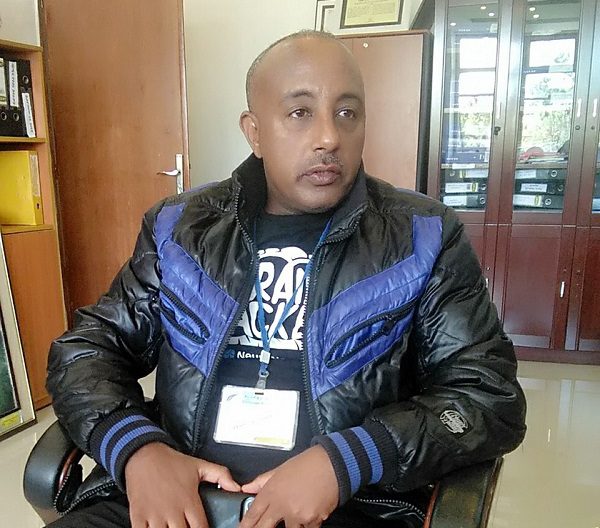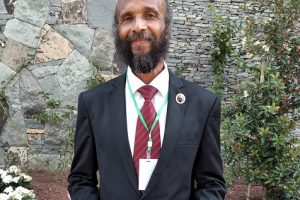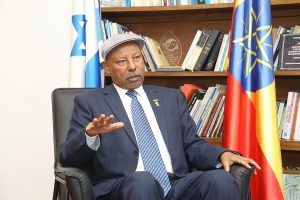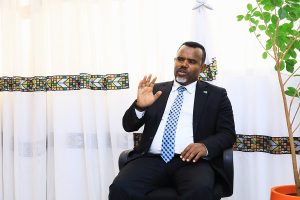
BY GIRMACHEW GASHAW
Dr.Mulugeta Semework Abebe was born in Debre Markos town of Amhara State and grew up in various places in Ethiopia. He attended secondary school in Woliso and went to Arba Minch town to sit for the Ethiopian Secondary School Leaving Examination (ESLCE).
After joining Asmara University for his first degree study he unfortunately interrupted it when the war of Eritrean Liberation got so close to the city and then Eritrea became an independent country. He then completed the remaining two years of his study at Haramaya University and received his first degree. Subsequently, he studied second degree in biochemistry.
He then went back to Israel for master’s thesis. In the meantime, he had a chance to go to America through the DV lottery but he did not want to. At last, he decided to go to America and see what happens. Even if he finished the research, he didn’t attend the graduation ceremony as he already went to America.
After travelling to USA, he studied another Master’s degree in neurobiology from Georgia State University in Atlanta and later did his PhD in neuroscience at SUNY Downstate Medical Center, New York.
He is currently living in New York City where he is serving as a Senior Software Engineer at DNA Nexus and research scientist at Columbia University. Currently, he is assisting companies ML/AL solutions for clinical and genetic data and studying how the brain remembers objects in our familiar environment.
He is also an author of two books, one written in English and the other is a poetry book in Amharic language. He plays piano at home, records it and then now professionals are actually remaking it. While he was in Addis, the Ethiopia Herald stayed for a while with him to know more about issues related to the Ethiopian Diaspora and their unreserved contribution to the national development. Have a nice read.
How do you observe the contribution of the Diaspora for the socioeconomic development of their country and protection of national territory?
Well, it is a very difficult question to answer. In the first place when we say Diaspora, it depends on which country you come from and the situations you are in.
So, as far as I can see, people in America, at least have the kind of flexibility in the choice to do quite a lot of things. Others who are residing in other countries are suffering or just working very hard to make ends meet.
They cannot come back to their country of origin as they do not have a visa. So it is very hard for anyone to do anything directly. On the other hand, academicians like me have the chance to travel and do different things. Though we have the options, it is sometimes very hard to come here and do anything useful as the country still needs a lot of infrastructure.
If you take my educational background for instance, I can only do very little things due to lack of technology, infrastructure and bureaucracy. If I want to conduct neuroscience research, it will take years. So it will be a waste of knowledge and time. However, the little things we can do have a greater impact.
Do you think that the Diaspora has been discharging citizenship responsibility?
It depends on how you see it. There is a lot of division due to politics. The main problem for most Diaspora is really not being able to come here because governments keep changing and the rules are very hard. And a lot of people complain about not being able to do anything. And the only reason why I can even do things like teaching, organizing seminars, capacity building training and I try to connect directly with people but most of them don’t have that choice. Whenever they try, there is a lot of blockage from everywhere.
People reach out to universities, hospitals so as to share what they have but nobody responds to them or they will take much time to respond to. They won’t come here. Most people who are living in America or Europe are a little better as the system is different and gives them more free time.
So in America, if you work for a company, depending on where you are, you may get two weeks or three weeks off the whole year. And then it takes five days to find somebody who shows you the office, or to give a seminar or you will not get enough people. So, it’s very discouraging.
This is everybody’s complaint, no matter what you do. So it is very hard to say the Diaspora has actually done what it should do because of many reasons. As they have been away for a long time, some Diaspora does not understand our culture, or how things work. So, they get discouraged easily.
The other thing is politics. In the previous regime, there were a lot of people who would never want to come home and do anything important for this country. It was dangerous for them to come back here. But now things have changed quite a bit.
There was a war which disrupted a lot of things. So it’s a combination of different things. But I honestly don’t think the Diaspora has been used properly. We could do a lot as I said by taking lessons from Israel. We definitely have not used any of the power, the money, the knowledge that the Diaspora has. It is very sad.
As a neuroscience researcher, what is your plan to share your knowledge and experience with physicians in Ethiopia?
Okay. There are at least three or four things I am looking at. And I’m slowly starting to get the time to actually come here and do some. I’ve been in school for a very long time and it was hard to travel. So in neuroscience, there are not many Ethiopian neuroscientists.
One thing that I want to do is, actually, to open a lab in one of the hospitals or universities here in Ethiopia and start teaching basic neuroscience as even the medical school neuroscience curriculum is vast and very hard to grasp unless you have continuous education. So if there was a lab, college students or medical doctors can go through and just learn the basics and they can actually watch things being done. That will change a lot of things.
The other is education. I want to keep coming here and educate people. And I can see the big knowledge gap here. And they also tell me like I try to explain things in a very simple and short way. It is still very difficult as there are no teaching aids such as books and videos. So I want to make education materials and videos in Amharic and English, specifically for Ethiopia.
The other thing is to collaborate with people and hopefully open rehab centers for people with traumatic brain injury. This research I’m doing actually a lot of people are interested in finding out how they can use it, to help people the first thing to know is always the problem. And then what you do with the problem is actually have a place.
The other thing I want to do is slowly start building up Ethiopian neuroscience and also software engineering as part of an Ethiopian endeavor to bring it up and actually can start with having big meetings in Ethiopia. , I can organize African neuroscientists and slowly start attracting other countries and other projects. We did the right projects with different universities last year. We submitted a request for grant though we didn’t get. We’re going to resubmit the request so that research will help a lot of people to actually be involved.
And that’s also the capacity building, so they can get exposed to different research. And also they can travel for research. So there are quite a lot of things I couldn’t do as there is not enough time to do everything. But at least you can start somewhere and slowly build up things.
Academicians working abroad are not equally treated with citizens of the country they live in? Is that true?
Yes. There are a lot of problems and it depends on where you are. America is actually one of the best places because I do see a lot of people. And I have a lot of friends who tell me the same thing and actually feel it when you travel to Europe and other countries. Black people are treated very differently. For me personally, I have been doing things in places that I am supposed to be.
Once they found out who you are or how you do things, people around you will treat you differently. And every day you find people who look at you and ask you what you are doing there. I go through a lot of problems but being an Ethiopian is actually very different and we don’t really feel it That is a kind of very important thing for people here to know. Most people do not realize how great we are or how great other people look at us. In fact in America you can meet people and they look at you differently. As soon as they find out you are an Ethiopian they say to everyone very different from us.
They say I know you are runners and I know you have a long history. In the end, it really depends on how you care for yourself though there are times when it is very hard. When I go to different meetings, I see people who are treating me differently until they know who I am. So you get the same kind of treatment from both kinds of people. The discrimination and everything is true but it is very different for us. I do not want to say that we are equally treated as Africans. That does not mean that we are not the same people who share the same problems. The main thing is to know who you are and help each other.
Do you think that there is an information gap between the Diaspora and local citizens?
Absolutely, that is one of the problems I want to help solve. I personally know a lot of people here and we have a big network to talk to each other and we do different things. Whenever someone wants to do something, they say ‘do you know someone who gives me the staff?’ ‘I have this material that I want to give someone and where do I send it?’ That is the problem that I want to bring together in one website.
There is a big gap because sometimes there is an organization called Afri, that I am part of, and has a lot of educated people mostly focused on information, teaching and capacity building and there are so many professionals on that website and most of them do not know what they can do here. And most Ethiopians do not know about that website. The first thing to do is to go there, if you want to find someone who is a physiologist. They can just go there and do something for us.
Materials are very short here. Like reading and teaching materials. And these people can provide all of that because as I said before when I give seminars, most of what I say does not make sense for many people as they do not have the information. Having less knowledge is because they are not exposed to the information.
What do you suggest for Ethiopian academicians who are dreaming to migrate and work in foreign countries?
Seeing how much they have here, how much they do not have. Most educated people are poor. Even doctors are educated enough to make a lot of money. They cannot end up looking outside and finding a way. That is very right. This is perfectly their legal right to think so and do it if they get the chance.
However, Ethiopia is changing as far as I can tell. My advice is to actually think about what they would do after they go. For us most people just leave but never come back. But there is a lot of opportunity if you come back, somebody who is less qualified than you will be a boss and it is hard.
I think that is going to change. I would say if you find an opportunity, better education and work there for as many years and come back to do many things here. Most of us are thinking like that. Most people who come here go back because they go to some office to get ID and it would take forever and ask some bribe or they get abused a lot. It is very discouraging for most people.
But in the end it has to happen somewhere. Going out to their education and coming back is fine. What I don’t like is going there to be rich and lead a happy life. That is going to happen because the other world is changing; there is a lot of movement. Xenophobia, less opportunities and things are not always as easy. They will be rich and lead a happy life. And most of their problems were solved. That is not going to happen because the other world is also changing.
Plus, depending on how educated you are here, it might not be as competitive as you think. I would say see what you can do here before you go out. In fact the best thing to do will be, to bring us and bring everybody back here and do a lot of things.
What should the government do to contain brain drain?
Allow dual citizenship which is extremely important and I have the suspicion that is the reason why the government does it. They do not do it; there may be bad people who use it for politics. Do bad things and say we are American and European? However, the majority of us who are doing a lot of tasks here are good people.
That is the first thing because when you have something like that you can actually get good jobs there; if you become a citizen you also have more power. Say I want to do this so you can convince more people there. And also when you come here you can relax in Ethiopia and do a lot of things and I think that would bring a lot of Diaspora back to work here.
The other is to keep rules very strict or right all the time, not change everything all the time. Especially coming here at the airport and going to any government office. We do get a lot of treatment and people try to help but overall that has to be better because most people have choices not to come here. Most people also do not understand how important they are and how important their knowledge is to the country of origin. Some would say ‘what did Ethiopia do for me? I do not care’ But if you make it so easy and good, people start coming.
The other thing I mentioned is, one of the people in the Diaspora Agency is to start bringing young people and find a way to pay for their trip whenever they come in at a very good program. They would go and visit different places and get a citizenship right. That is one of the things that I learned when I was in Israel.
They will never forget that they would think about what they would do in the future and they come back after they are educated. Ethiopians are among the most educated people in the world and one of the decent human beings that everybody agrees on. You can use them. Again Politics is a different thing and does not disappoint us. It goes a long way when you do that. People want to do something and they change their mind. It is very hard to check back.
Thank you very much.
It is my pleasure.
THE ETHIOPIAN HERALD SATURDAY 4 FEBRUARY 2023





